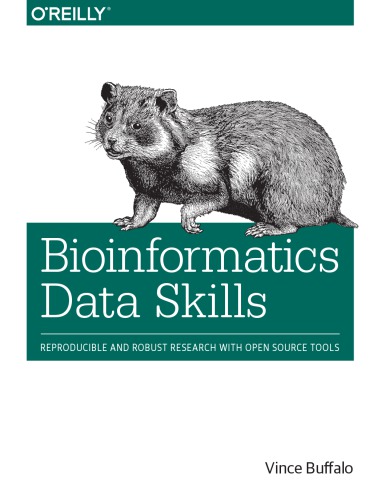

Most ebook files are in PDF format, so you can easily read them using various software such as Foxit Reader or directly on the Google Chrome browser.
Some ebook files are released by publishers in other formats such as .awz, .mobi, .epub, .fb2, etc. You may need to install specific software to read these formats on mobile/PC, such as Calibre.
Please read the tutorial at this link: https://ebookbell.com/faq
We offer FREE conversion to the popular formats you request; however, this may take some time. Therefore, right after payment, please email us, and we will try to provide the service as quickly as possible.
For some exceptional file formats or broken links (if any), please refrain from opening any disputes. Instead, email us first, and we will try to assist within a maximum of 6 hours.
EbookBell Team

4.1
100 reviewsRather than teach bioinformatics as a set of workflows that are likely to change with this rapidly evolving field, this book demonstrates the practice of bioinformatics through data skills. Rigorous assessment of data quality and of the effectiveness of tools is the foundation of reproducible and robust bioinformatics analysis. Through open source and freely available tools, you'll learn not only how to do bioinformatics, but how to approach problems as a bioinformatician.
• Go from handling small problems with messy scripts to tackling large problems with clever methods and tools
• Focus on high-throughput (or "next generation") sequencing data
• Learn data analysis with modern methods, versus covering older theoretical concepts
• Understand how to choose and implement the best tool for the job
• Delve into methods that lead to easier, more reproducible, and robust bioinformatics analysis
[From the Back Cover]
Learn the data skills necessary for turning large sequencing datasets into
reproducible and robust biological findings. With this practical guide, you’ll
learn how to use freely available open source tools to extract meaning from
large complex biological datasets.
At no other point in human history has our ability to understand life’s
complexities been so dependent on our skills to work with and analyze data.
This intermediate-level book teaches the general computational and data skills
you need to analyze biological data. If you have experience with a scripting
language like Python, you’re ready to get started.
• Go from handling small problems with messy scripts to tackling
large problems with clever methods and tools
• Process bioinformatics data with powerful Unix pipelines
and data tools
• Learn how to use exploratory data analysis techniques in the
R language
• Use efficient methods to work with genomic range data and
range operations
• Work with common genomics data file formats like FASTA,
FASTQ, SAM, and BAM
• Manage your bioinformatics project with the Git version
control system
• Tackle tedious data processing tasks with with Bash scripts
and Makefiles
Vince Buffalo is currently a first-year graduate student studying population
genetics in Graham Coop's lab at University of California, Davis, in the Population
Biology Graduate Group. Before starting his PhD in population genetics, Vince
worked professionally as a bioinformatician in the Bioinformatics Core at the UC
Davis Genome Center and in the Department of Plant Sciences.